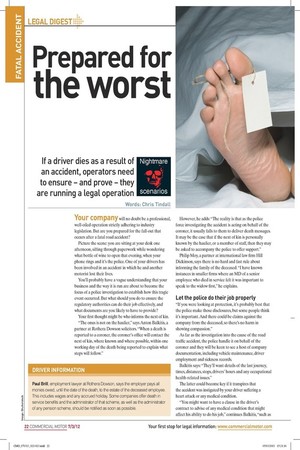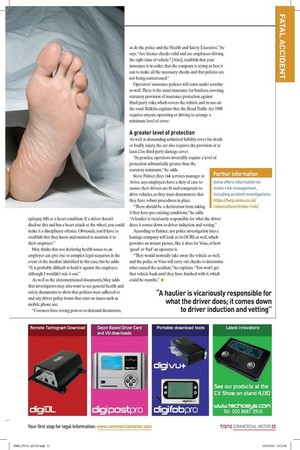Prepared for the worst If a driver dies as a
Page 15

Page 16

If you've noticed an error in this article please click here to report it so we can fix it.
result of an accident, operators need to ensure and prove they are running a legal operation Your company will no doubt be a professional, well-oiled operation strictly adhering to industry legislation. But are you prepared for the fall-out that occurs after a fatal road accident?
Picture the scene: you are sitting at your desk one afternoon, sifting through paperwork while wondering what bottle of wine to open that evening, when your phone rings and it's the police. One of your drivers has been involved in an accident in which he and another motorist lost their lives.
You'll probably have a vague understanding that your business and the way it is run are about to become the focus of a police investigation to establish how this tragic event occurred. But what should you do to ensure the regulatory authorities can do their job effectively, and what documents are you likely to have to provide?
Your first thought might be who informs the next of kin.
"The onus is not on the haulier," says Anton Balkitis, a partner at Rothera Dowson solicitors. "When a death is reported to a coroner, the coroner's office will contact the next of kin, where known and where possible, within one working day of the death being reported to explain what steps will follow." However, he adds: "The reality is that as the police force investigating the accident is acting on behalf of the coroner, it usually falls to them to deliver death messages. It may be the case that if the next of kin is personally known by the haulier, or a member of staff then they may be asked to accompany the police to offer support."
Philip Moy, a partner at international law firm Hill Dickinson, says there is no hard and fast rule about informing the family of the deceased. "I have known instances in smaller firms where an MD of a senior employee who died in service felt it was important to speak to the widow first," he explains.
Let the police do their job properly "If you were looking at protection, it's probably best that the police make those disclosures, but some people think it's important. And there could be claims against the company from the deceased, so there's no harm in showing compassion."
As far as the investigation into the cause of the road traffic accident, the police handle it on behalf of the coroner and they will be keen to see a host of company documentation, including vehicle maintenance, driver employment and sickness records.
Balkitis says: "They'll want details of the last journey, times, distances, stops, drivers' hours and any occupational health-related issues."
The latter could become key if it transpires that the accident was instigated by your driver suffering a heart attack or any medical condition.
"You might want to have a clause in the driver's contract to advise of any medical condition that might affect his ability to do his job," continues Balkitis, "such as epilepsy, MS or a heart condition. If a driver doesn't disclose this and has a heart attack at the wheel, you could make it a disciplinary offence. Obviously, you'd have to establish that they knew and omitted to mention it to their employer."
Moy thinks that not declaring health issues to an employer can give rise to complex legal scenarios in the event of the incident identified in this case, but he adds: "It is probably difficult to hold it against the employer, although I wouldn't rule it out."
As well as the aforementioned documents, Moy adds that investigators may also want to see general health and safety documents to show that policies were adhered to and any driver policy forms that exist on issues such as mobile phone use.
"Coroners have strong powers to demand documents, as do the police and the Health and Safety Executive," he says. "Are licence checks valid and are employees driving the right class of vehicle? [Also], establish that your insurance is in order, that the company is trying as best it can to make all the necessary checks and that policies are not being contravened."
Operators' insurance policies will come under scrutiny as well. There is the usual insurance for hauliers, covering statutory provision of insurance protection against third-party risks, which covers the vehicle and its use on the road. Balkitis explains that the Road Traffic Act 1988 requires anyone operating or driving to arrange a minimum level of cover.
A greater level of protection As well as demanding unlimited liability cover for death or bodily injury, the act also requires the provision of at least Lim third-party damage cover.
"In practice, operators invariably require a level of protection substantially greater than the statutory minimum," he adds.
Steve Palmer, fleet risk services manager at Aviva, says employers have a duty of care to ensure their drivers are fit and competent to drive vehicles, so they must demonstrate that they have robust procedures in place.
"There should be a declaration form asking if they have pre-existing conditions," he adds. "A haulier is vicariously responsible for what the driver does; it comes down to driver induction and vetting."
According to Palmer, any police investigation into a haulage company will look at its OCRS as well, which provides an instant picture, like it does for Vosa, of how 'good' or 'bad' an operator is.
"They would normally take away the vehicle as well, and the police or Vosa will carry out checks to determine what caused the accident," he explains. "You won't get that vehicle back until they have finished with it, which could be months." •







































